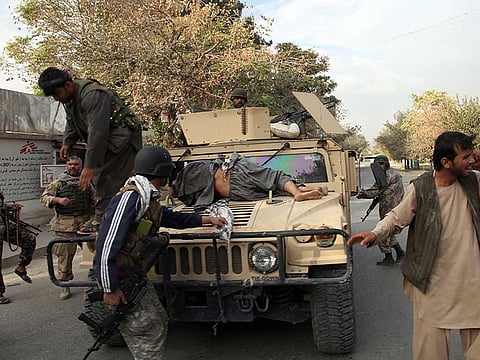Taliban capture of Kunduz is no surprise
The strategic location is being pounded by extremists and Afghan government forces, who claim the city has been retaken

The Taliban’s capture of the northern Afghan city of Kunduz was a catastrophic blow to the beleaguered government of President Ashraf Gani, who has been in office for a year. But it has much wider implications for the region.
It was a significant setback for the United States and Nato, who have spent much blood and money on trying to secure Afghanistan since 2001, but withdrew most of their forces this year despite clear warnings that the situation in the north was deteriorating. There are still 9,800 US and Nato personnel in the country, and President Barack Obama has promised to pull them out by early next year. It will also strengthen Mullah Akhtar Mohammad Mansour, the new Taliban leader, and help reunite the insurgents, who have been divided by factionalism since he was chosen last month. His rivals can now do little but agree to his leadership. Proposed peace talks between the Taliban and the government are in jeopardy.
But the greatest threat is to central Asia and western China. Kunduz borders both regions and could become a hub for central Asian militants who helped the Taliban conquer the city. Senior officials in central Asia say the insurgents and their allies pose the biggest risk to stability there.
When a few hundred Taliban advanced on Kunduz at dawn on September 28, they met little opposition from the estimated 7,000 government forces stationed there. By midday, they had captured half the city, freed hundreds from jail, looted banks, government buildings and United Nations and Red Cross offices and set up the first Taliban administration in a large Afghan city since their defeat by US forces in 2001. And although the government has claimed that they have retaken the city after days of battling the Taliban, the takeover of Kunduz was hardly a surprise. The Taliban have held 70 per cent of Kunduz province all year and in June launched an abortive attack on the city of an estimated 300,000 people. Their forces have since been sitting in villages just five miles (eight kilometres) from the city of Kunduz, but the Afghan army, police and local government militias made no attempt at a counter-offensive. Western intelligence has been sporadic and there is no fully quipped Afghan air force.
Ideal base
The fallout from Kunduz is likely to be felt across the region. Western and central Asian intelligence and diplomatic officials agree that many Taliban militants are not Afghans. They are Uzbeks, Tajiks, Turkmen, Kyrgyz and Kazakhs from the five central Asian republics, who have been fighting for the Taliban in their own designated groups, such as the Islamic Movement of Uzbekistan, the Islamic Jihad Union and Jamaat Ansarullah. There are also Chechens and Dagestanis from the Caucasus and Uighurs — Chinese Muslims fighting under the banner of the East Turkestan Islamic Movement, but trying to free their homeland in the province of Xinjiang from Beijing’s control. There are even elements of Al Qaida, Daesh (the self-proclaimed Islamic State of Iraq and the Levant) and fighters from Pakistan.
For a decade, these militants have been based in the tribal areas between Afghanistan and Pakistan. Operations by the Pakistani army have, since June 2014, pushed these extremists into Afghanistan. The Afghan army made no attempt to stop them. Kunduz will give the Taliban and their allies an ideal base from which to send fighters, explosives and money to destabilise China and central Asia. Russia, which has 7,000 troops stationed in southern Tajikistan, would become embroiled, along with China. The dangers of increased terrorism and a wider regional conflict will increase. The capture of Kunduz fits strategically into recent Taliban conquests of the north-eastern Afghan provinces of Badakhshan, Kunar and Nuristan. These allow access to Tajikistan and central Asia.
The US and Nato show little interest in retaining a presence in this volatile region. Russia and China have huge armies, but are ill-equipped to deal with terrorism and prolonged guerrilla war there. Yet all four big powers could cooperate militarily and diplomatically to help strengthen Afghanistan and secure central Asia. Unless much greater attention is paid to the region we can expect more Taliban conquests.
— Financial Times
Ahmed Rashid is the author of several books about Afghanistan, Pakistan and central Asia, most recently Pakistan on the Brink.
Sign up for the Daily Briefing
Get the latest news and updates straight to your inbox



